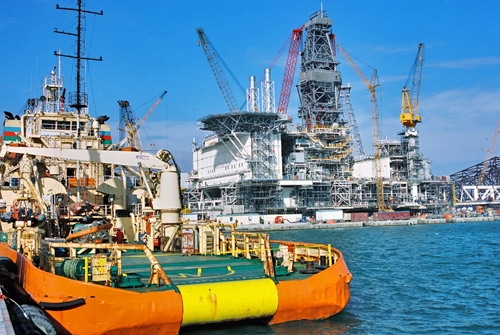Gas reserves for Europe – Freedom of religion for Christians and Jews – Continued occupation by Armenia in spite of UN resolutions
After the catastrophe at Fukushima, Germany decided to completely transform its energy policy. All parties are in favor of abandoning nuclear power by 2022. In light of this decision, Europe’s largest industrial economy will be increasingly dependent on imports of natural gas as well having to produce its own renewable power.
Berlin is now forced to look for additional political and economic partners. Looking beyond the solid transatlantic relationship, Berlin’s focus is now being turned to the Caucasus region. Economies there are on the up, with vast untapped quantities of natural resources, there are many promising opportunities for rewarding partnerships.
The growing Importance of Baku
One potentially vital strategic partner for Berlin in the region is Azerbaijan. Both the private and public sectors are increasingly aware of the growing importance of Baku. Economic representatives from Germany and Europe have been sounding out the potential for collaborative projects in the country. The central focus of these trade missions is of course Azerbaijan’s substantial oil and gas reserves.
The geo-economic situation was cast into spotlight at the end of last year when work began on the South Stream gas pipeline which will stretch from Russia to Europe via the Black Sea. The first weld on the pipeline was celebrated by Gazprom CEO Alexej Miller as a victory. After all, President Putin is convinced that this pipeline is imperative for Russia and will cement Russian gas domination on the European market, especially in Germany.
Avoiding one-sided energy dependence
For its part, the EU wants to avoid one-sided energy dependence and is taking steps to ensure that gas from Azerbaijan can also be piped westwards to EU member states. The EU’s Energy Commissioner Günther Oettinger is particularly active in trying to prevent the EU from becoming entirely dependent on Russian gas imports.
“For Europe, it will become increasingly important that we secure our long term supply of energy. Azerbaijan is politically stable and an important strategic supplier of gas and oil, particularly for Europe,” Oettinger told the JVG. Germany’s federal government and its parliamentary opposition are also beginning to discern the importance of Azerbaijan for Germany’s future.
Federal Minister of Economics, Philipp Rösler, emphasizes: “Looking to secure its future energy supply, it is of vital importance that Germany has long term and reliable partners at its side. Azerbaijan can make a significant contribution to the diversification of our energy supplies, thereby reducing dependency on other source countries.“
Fields of gold – Shah Deniz
Lying buried beneath the Shah Deniz gas field, one of the largest in the world, is the fundament for a much needed diversification of EU energy supplies. A decision will be made in March on whether the gas to Western Europe will be delivered through the Nabucco West or TAP pipelines.
Up until the end of 2012, the Nabucco project, which will bring the gas through Turkey, Bulgaria and Austria, enjoyed the backing of the big German energy company RWE who had a 17% share in the project. Claiming that a reappraisal of the project drew negative conclusions, RWE unexpectedly sold its share to the Austrian OMV group on the very day work began on South Stream. This sale will surely narrow the Essen based energy giant’s future options.
The alternative TAP pipeline will deliver Azeri gas through Greece, Albania then popping across the Adriatic to Italy. The TAP consortium includes Germany’s E.ON, Statoil from Norway and the Swiss EGL. At the moment the TAP project seems to have its nose forward in race to land this enormous investment. The countries along the chosen route can expect substantial windfalls to the tune of double-digit billions.

